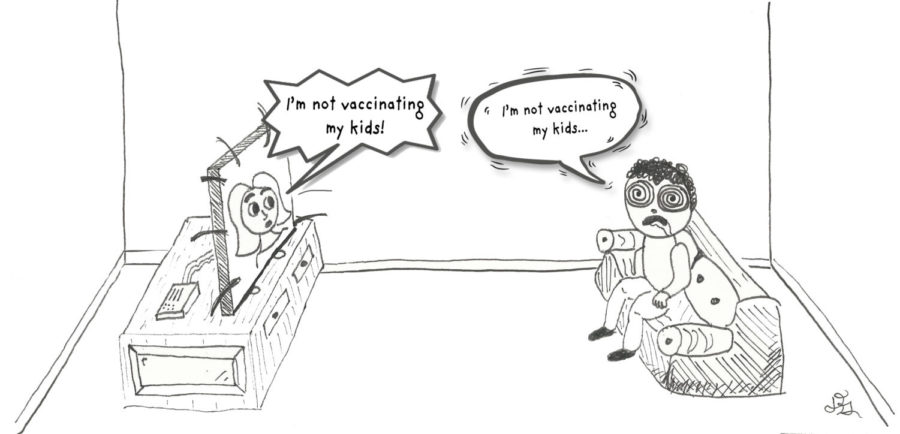Staff Editorial: Wearing the Modern-Day Blindfold
Through the growth of both mainstream and social media, celebrity platforms have grown tremendously, allowing them to reach larger audiences than ever before. While there have been numerous incidents in which celebrities have used their influence positively, consumers of media today must be careful when heeding the information and advice of celebrities, especially when it applies to personal health and conflicts with professional opinion.
One pertinent example is actress Jenny McCarthy’s activism in the anti-vaccine movement. McCarthy, who argues that vaccinations were the most prominent cause of her son’s development of autism, is currently the president of Generation Rescue, a nonprofit that advocates that vaccinations are connected to autism. According to NBC, science journalist Seth Mnookin estimates that McCarthy’s appearances on talk shows like “Oprah” have helped her message reach 15 to 20 million viewers. The increase in her publicity reveals the influence celebrities have over the public, as she was able to get her unscientific claims on respected television shows.
As a result of her advocacy and many others, there has been a rise in the anti-vaccination movement, with members often citing disproven ties to autism or other health-related issues.
The most direct effect of this movement can be seen in Oregon, where “Paul Cieslak, a medical director in the communicable disease prevention and immunization department at Oregon Health Authority, said that the exemption numbers (for vaccines) jumped from 1 percent in 2000 to 7.6 percent for the 2016-2017 school year—a trend he attributes almost entirely to the anti-vaccination movement,” according to an article from PBS.
While an extreme example, the push from celebrities against vaccines shows how people are becoming conditioned to affirm celebrities’ opinions, which supports a study conducted by assistant professor Steven Hoffman published in The Boston Medical Journal.
In the digital age that we are a part of, social media has been shown to be the most popular news platform for young adults, according to an article from the Pew Research Center. As social media becomes more of a news outlet, celebrities now have a much more impressionable audience than before and their viewers should not take what celebrities say as fact.
The impact of celebrity culture is also seen the profitable weight loss industry, which often faces little regulation from the government. For teenagers today, there is a high possibility that they have seen celebrity influencers like Cardi B, who has 41.8 million followers on Instagram, endorse detox tea. Ultimately, the ramifications of such endorsements have negative impacts on their audiences, as they create unrealistic and unhealthy standards for body images, especially for women and young adults, according to an article from Business Insider.
Healthcare professionals also warn against detox diets and cleanses, as they lack scientific support and recommend healthy eating and exercise instead, according to an article from the Chicago Tribune. A study published by research firm SPINS showed that consumers spent over $62 million on detox and weight-loss products in retail stores in 2018 alone, and in an interview with The Daily Telegraph, the medical director of the National Health Services healthcare system Stephen Powis argued that young people could risk their mental and physical health in an attempt to emulate celebrities. The worrisome rise in people participating in various cleanses shows the effects of celebrity influence as stars continue to endorse unhealthy products on social media.
That is not to say that celebrities have not left positive impacts on the online community. For example, according to CNN, there was a visible spike in voter registration, 65,000 people in 24 hours, after pop singer Taylor Swift recommended visiting vote.org. The “Taylor Swift effect,” as dubbed by the article, is one of many prominent examples showing that celebrities can and should use their platform to help build a more informed audience.
However, there are still many celebrities who do endorse unhealthy and incorrect information, which encourages a growing culture of people actively choosing to listen to their favorite stars over their doctors. It is important to differentiate between advice that can harm you, such as not being vaccinated and advice that cannot hurt you, such as registering to vote.
As social media continues to outgrow other older forms of media, we as consumers of media must be aware of such nuanced issues like vaccination; we should not blindly follow the advice of celebrities who are already larger-than-life and should conduct our own research while taking into account biases that may be present in their social media posts.
Your donation will support the student journalists of Portola High School. Your contribution will allow us to purchase equipment and cover our annual website hosting costs.

Dylan Gates is the Media Director of the 2018-2019 Portola Pilot staff. He is in his Junior year at Portola and has been working with the Pilot since the...




